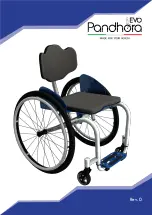
67
Batteries - storage
Batteries
• In case when the wheelchair will remain unused for a longer period of time, take
the batteries out and store them in a dry and cold place.
• Avoid complete failure of the battery.
• If you are using the wheelchair every day, charge batteries every day.
• If you are using the wheelchair once a week, charge batteries once a week.
• It is not allowed to partially charge batteries (f. ex. connect batteries for a shorter
time than a full charging cycle), as this may damage the battery or limit its durability.
• Only fully charged batteries can be stored.
• If you are not using your wheelchair on regular basis, in order to maintain durability
of batteries, charge them at least once every two weeks, observing a full charging
process.
• Always replace the batteries with the ones delivered with your wheelchair.
• In case when the battery is damaged or has to be changed, report to your distributor.
Do not throw the battery into the recycle bin, instead, handle it to the distributor.
• In order to prevent short circuit and battery damage never touch battery contacts
with metal objects.
1. The wheelchair is equipped with batteries with long lifespan. Batteries are sealed
and they do not require maintenance (the so-called maintenance-free batteries).
2. The following situations can cause increased energy consumption and hence
decrease the range of the wheelchair: ascending hills, overload, winter.
3. Observing the following principles will allow to prolong the lifespan of batteries:
• Avoid complete discharge of batteries. Charge the battery after everyday use.
• During first charging, disconnect the plug after 40 hours, when the battery is
fully charged.
• IF you are not using the wheelchair on regular basis, to maintain durability of
batteries, charge them every three days, observing a full charging cycle.
4. Do not take the cover out from maintenance-free batteries. It is not allowed to add
water to the battery.
5. Leak of acid from the battery may cause burns or loss of vision. In case when the
acid from the battery comes into touch with the skin, eyes, garments or any other
object, rinse it thoroughly with running water and immediately report to undergo
medical consultation.
6. Do not use other batteries than the original batteries attached to the wheelchair,
as this may result in product damage.
7. Make sure that during transport, both the wheelchair and batteries are properly
secured.
8. Batteries are subject to wearing and that is why the range of the wheelchair will
decrease. It is essential to exchange the batteries when the range of the wheelchair
decreased by half, despite complete charging of the battery.
9. It is essential to change both batteries at the same time, in order to ensure their
long-lasting and effective functioning.










































